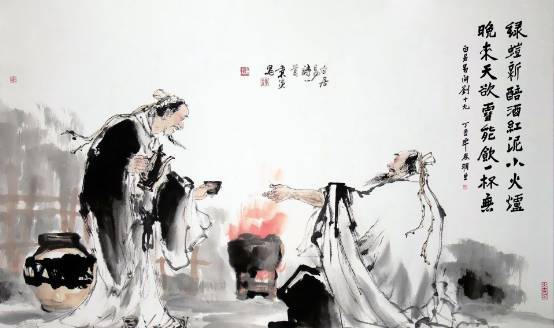寒食后,酒醒却咨嗟。休对故人思故国,且将新火试新茶。诗酒趁年华。
春未老,风细柳斜斜。试上超然台上看,半壕春水一城花。烟雨暗千家。
I shall often start my blog with a poem. It primarily helps me to set my mood for the post, so I most likely will not refer to it. (If you want to read and guess why I selected it, by all means, entertain yourself 🙂
Indeed, I have lived in places where the legal age of drinking is 18 or 16, but those alone cannot justify the frequency at which I mention ‘I wish I could have some wine/sake right now.’
(Obviously such a wish has never been fulfilled here).
So, let’s talk about drinking.
NARNIX DICTIONARY
Please expect to see NARNIX DICTIONARY in later posts. I promise there to be 0% scholarly content within these definitions. You may check the full list for fun here.
- Theoretic-Alcoholism:
An unusual zest toward
drinking / the idea of drinking
under a set of particular circumstances
with very specific requirements on
date, time, location, natural environment, human company and emotional state.Theoretic-alcoholism is often observed in people who are into Chinese literature. Its origin can be traced back to contents in poetry. Today, I will introduce two common triggering settings for theoretic-alcoholists (more to come in later posts!).
Setting 1
It is a cold, grim, winter day. You sit in your home, alone. You have been thinking, pondering for a long time. You feel isolated from others, both physically and mentally. You look outside of your window. It’s falling dark, the sky is grey and cloudy, it may snow soon.
You long to talk to someone—a friend. So, an Invitation you send.

For each poem I refer to, I will put the word-by-word presentation and my own translation (in italic). Click on the title of the poem if you want to learn more. You can find various interpretations and explanations of key cultural concepts in our [Poetry Collection].
Invitation
Bai JuYi
New-brewed wine under fresh foam,
Sizzling upon my red clay stove.
Dusk falls, soon will snow,
Would you like a cup or two?
(My own translation)

The friend will come. You will sit in your backyard around the warm little stove; through its red clay the firewood will glimmer. You will heat the newly brewed wine upon the wavering fire; the green foam on the surface of the wine will sizzle and the warm fragrance of grain will spread. Snow will fall. With a friend who truly understands you by your side, you will drink the hot wine, talk, and watch as the world turns white.
This is one of my favourite poems of all time. With four lines and a mere 20 characters, the poem grasps the essence of friendship. Not just any friendship, but a deep interpersonal connection that is characteristic in Chinese culture — often referred to as ‘知己’ (zhi ji). Here, ‘知’ (zhi) means ‘to know, to understand, to empathize’, and ‘己’(ji) means ‘self’. Hence, 知己 translates directly to ‘someone who knows my true self’.
But what is a 知己, really? Everyone has a different interpretation and only you can answer that for yourself. Perhaps several faces are crossing through your mind as you read these words.
The magic of poetry lies in that it roots a web of images and impressions in our minds. For me, the concept of 知己 is inextricably linked to this poetic Invitation. A 知己 is someone to whom I will send such an Invitation, someone who I know will fit into the picture painted in this poem, someone who can warm my soul like the red clay stove and hot wine on a snowy day, someone who will one day send such an invitation to me.
Now, read the poem again.
Yes, good idea, but only after the end of shelter-in-place 🙂
Setting 2
In general, the prevalent references to drinking in Chinese literature have two traits in common. First, the poets are mostly on the less jovial half of the emotional spectrum: nostalgia, sorrow, frustration, desolation, grief, etc. Second, the poets themselves often acknowledge the moral impropriety when referring to drinking during daytime.
Let me further clarify the second point. In ancient times, (and somewhat similarly today), drinking during the day was considered inappropriate by the society as a whole. The underlying convention is that it is okay for one to dwell in emotions at night, whether it be drinking alone or expressing oneself in poetry, so long as one remains productive and normal-functioning during the day.
As with all conventions, this convention is often broken intentionally by the poets as a symbol of their desolation or rebellion. Most of the time, if a poet refers to his/her being drunk at midday, they are openly saying: ‘Yes, I know I’m not supposed to, but I am so desperate/ sad/ messed up/ tired of this society/ devastated by emotions that I am breaking this basic rule.’ Keep this in mind, as we shall see tons of examples later on.
But the poem I am going to talk about now is different. It stands out as probably THE HAPPIEST poem of all time, written by the poet who is known for conceiving human sufferings to its greatest width and depth. Remember the poet’s name, 杜甫 (Du Fu).
杜甫 (712-770 AD) lived through a transition period of the Tang Dynasty. Despite living most of his life under political persecution, extreme poverty, and flight from war, 杜甫 remained a most devout follower of the Confucianism moral code. His empathy for the suffering of the people and loyalty to his country is shown extensively through poetry.
The poem 闻官军收河南河北 (On Hearing the Reclaim of Lost States) is written in 763 BC, when 杜甫 was 51 years old. To draw an analogy for today, imagine the poem being written by a seventy-year-old professor who is old-school and upright in his moral values and demeanor, to the extreme. Now, in this very poem, he enthusiastically depicts himself drinking at midday:

Translation by Stephen Owen
Hearing That the Imperial Army Has Retaken HeNan and HeBei
Beyond Swordgate the news suddenly comes that we've recaptured Jibei,
on first hearing it, tears cover my clothes.
I look around to my wife and children, what sadness remains?
I carelessly roll up poems and writing almost mad with delight.
White-haired, I sing out loud, I should drink ale as please,
with green spring as companion it's just right for going home.
I'll go right down through the Ba Gorges, thread my way through the Wu Gourges,
then on down to Xiangyang, where I'll head to Luoyang.
(Du, F., & Owen, S. (2016). The poetry of Du Fu =: Du Fu shi.)
In the above translation, Owen translated the phrase “白日” as ‘White-haired’. The actual meaning of this phrase has always been under debate. To generalize, the phrase could be interpreted literally to mean ‘midday’, or as a metaphorical reference that the author has passed the youthful stage of his life (like the rising sun), and wish to return to his hometown as an elderly man (toward the sunset).

杜甫 wrote this poem at the end of a civil war and riot, after eight years of flight as a refugee, after witnessing millions of ordinary people suffer under violence and flee for their lives, after being stranded in a foreign town, not knowing if he would ever return home again.
Joy: the most sincere, intense joy. Joy for himself, for his deepest longing to return to his hometown. Joy for his wife and children, for they shall finally have a settled life. Joy for his country, for it is again united in peace. Joy for the people, who will no longer suffer from violence and hunger, and shall return home to a better living.
Does such joy not move one to tears? Is such joy not worth unrestrained singing and a few indulged cups of wine at daytime? Every time I view in my mind the picture of 杜甫—an old man with hair greyed from years of suffering—crying, singing, laughing and drinking on this day, I cannot help but be moved.
Of all contexts and settings for indulgence in day-drinking, this one is justified.
Of the all-too-often sighs of self-pity and nostalgia in Chinese literature (of course they too deserve merit, you shall later see), the emotions of 杜甫 oustands with their realness.
Personally, it reminds me of my accelerated heartbeats as the plane first landed back home after my first year living abroad. And I hope, in the near future, I shall think of this poem with a sigh of joy and relief at the end of this pandemic, for the wellness of people I love, for flying back home, and for the wellness and reunion of families around the world.
All of that would be worth opening a bottle of Champagne at noon.

